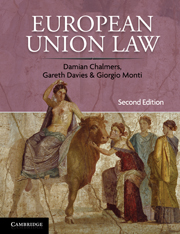Book contents
- Frontmatter
- Contents
- Map
- Preface
- Abbreviations
- Table of Cases
- Table of Treaties, Instruments and Legislation
- Table of Equivalents
- Electronic Working Paper Series
- 1 European Integration and the Treaty on European Union
- 2 The EU Institutions
- 3 Union Law-making
- 4 The EU Judicial Order
- 5 The Authority of EU Law
- 6 Fundamental Rights
- 7 Rights and Remedies in National Courts
- 8 Infringement Proceedings
- 9 Governance
- 10 Judicial Review
- 11 EU citizenship
- 12 EU Law and Non-EU Nationals
- 13 Equal Opportunities Law and Policy
- 14 EU Criminal Law
- 15 External Relations
- 16 The Internal Market
- 17 Economic and Monetary Union
- 18 The Free Movement of Goods
- 19 The Free Movement of Services
- 20 The Pursuit of an Occupation in Another Member State
- 21 Trade Restrictions and Public Goods
- 22 EU Competition Law: Function and Enforcement
- 23 Antitrust and Monopolies
- 24 State Regulation and EU Competition Law
- Index
11 - EU citizenship
- Frontmatter
- Contents
- Map
- Preface
- Abbreviations
- Table of Cases
- Table of Treaties, Instruments and Legislation
- Table of Equivalents
- Electronic Working Paper Series
- 1 European Integration and the Treaty on European Union
- 2 The EU Institutions
- 3 Union Law-making
- 4 The EU Judicial Order
- 5 The Authority of EU Law
- 6 Fundamental Rights
- 7 Rights and Remedies in National Courts
- 8 Infringement Proceedings
- 9 Governance
- 10 Judicial Review
- 11 EU citizenship
- 12 EU Law and Non-EU Nationals
- 13 Equal Opportunities Law and Policy
- 14 EU Criminal Law
- 15 External Relations
- 16 The Internal Market
- 17 Economic and Monetary Union
- 18 The Free Movement of Goods
- 19 The Free Movement of Services
- 20 The Pursuit of an Occupation in Another Member State
- 21 Trade Restrictions and Public Goods
- 22 EU Competition Law: Function and Enforcement
- 23 Antitrust and Monopolies
- 24 State Regulation and EU Competition Law
- Index
Summary
INTRODUCTION
This chapter considers the ideas and rights associated with European Union citizenship. This is granted by the Treaty to all those who are citizens of one of the Member States of the European Union. It is organised as follows.
Sections 2 and 3 discuss ideas of citizenship.
(a) Modern citizenship evolved in the period of the industrial revolution, following the American and French revolutions. Society became less feudal and more democratic and individuals acquired more rights and possibilities. The core elements of the resulting notion of citizenship were legally enforceable rights, loyalty, a sense of belonging to the national community and participation in political decision-making.
(b) One view of European Union citizenship is that it follows this tradition. On this view, citizenship is a limited success. Rights are only for those who migrate and who are economically active or independent. The sense of a community of Europeans is thus but a pale shadow of that found in nation-states and citizens do not have political rights to participate in some of the most important elections.
(c) Others would like to see EU citizenship break with nationality and include all those living within the European Union, even if they have the nationality of a non-EU state. This would make EU citizenship more open, accessible and a true challenge to nationalism, arguably in the original spirit of the Union.
[…]
- Type
- Chapter
- Information
- European Union LawCases and Materials, pp. 439 - 484Publisher: Cambridge University PressPrint publication year: 2010



